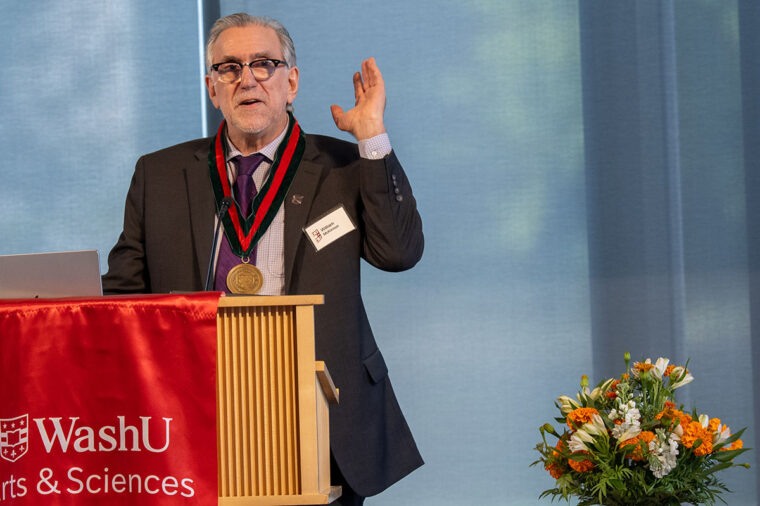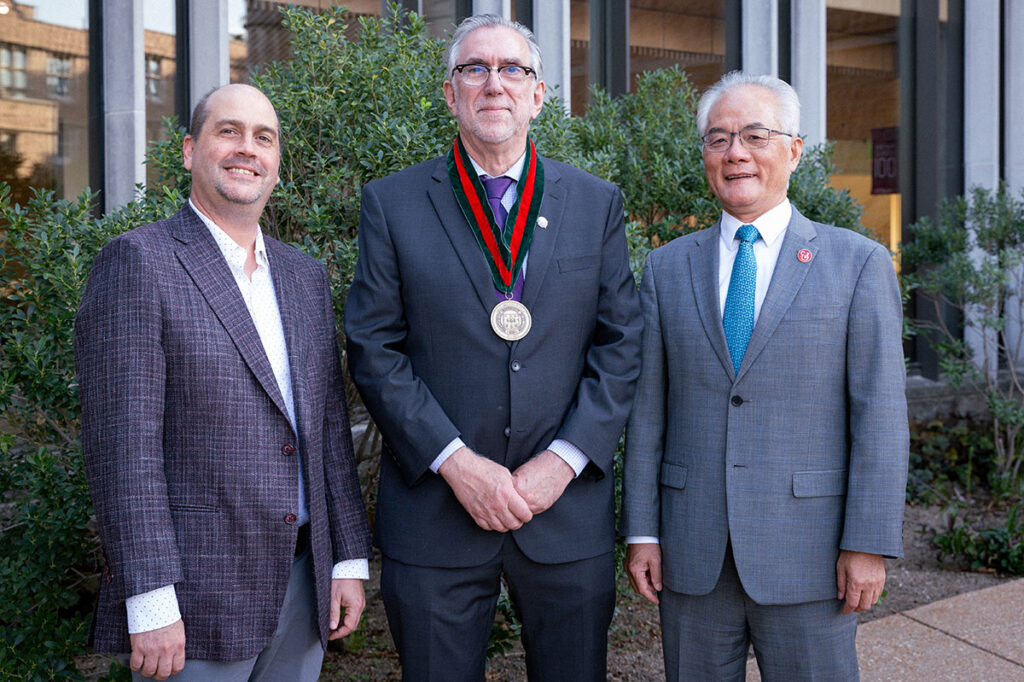
William B. McKinnon, a professor of earth, environmental and planetary sciences at Washington University in St. Louis, was installed as the Clark Way Harrison Distinguished Professor in a ceremony Sept. 30.
McKinnon studies the icy satellites of the outer solar system and the physics of impact cratering. His research concentrates on structure, origin, evolution, tectonics and bombardment history of outer planet satellites and Kuiper belt objects, which are beyond Neptune's orbit. He also is serving as interim director of WashU's McDonnell Center for the Space Sciences, where he is a longtime fellow.
"Bill McKinnon's curiosity and persistence have led to projects that push forward humanity's knowledge of planetary bodies," Chancellor Andrew D. Martin said. "He shares a joy of discovery that is infectious and recognizable among his many colleagues at WashU and beyond."
McKinnon remains active in efforts to push space exploration farther. NASA successfully launched the New Horizons mission to Pluto and the Kuiper Belt, a mission McKinnon helped conceive and was a touchstone for much of his career. Closer in are the newer missions of NASA's Europa Clipper, which will explore Jupiter's potentially habitable ocean moon, and the European Space Agency's Jupiter Icy Moons Explorer, which will focus on Ganymede. McKinnon has mission roles in both projects.
"Thanks to his decades of work in earth and planetary sciences, we understand far more about our solar system than anyone imagined was possible," Feng Sheng Hu, the Richard G. Engelsmann Dean of Arts & Sciences and the Lucille P. Markey Distinguished Professor, said during the installation ceremony. "His work has taken us to the ends of the solar system, around the moons of outer planets, and beyond the boundaries of our earthly imaginations."
McKinnon's deep childhood interest in the planets led to his doctoral research. After postdoctoral research with a member of NASA's Voyager mission imaging team, which captured Jupiter and its moons, there was no turning back.
"I knew I wanted to do science," said McKinnon, adding that he became drawn to physics, then, the "geology of worlds." Specifically, he wanted to study the icy planetary bodies that dot our solar system (and beyond). "There's almost infinite variety of scientific experience in the icy worlds."
Watch the full ceremony on the Arts & Sciences Youtube page.
About William F. McKinnon
McKinnon earned a bachelor's degree in earth and planetary sciences from Massachusetts Institute of Technology. After earning a master's degree in planetary science and doctorate in geophysics and planetary science from the California Institute of Technology, McKinnon was a postdoctoral associate at the Lunar and Planetary Laboratory of the University of Arizona in Tucson.

McKinnon joined the WashU faculty in 1982. He has shown leadership and service to the planetary science community in many ways. He has served as a past chair of the Division for Planetary Sciences (DPS) of the American Astronomical Society; president of the planetary sciences section of the American Geophysical Union (AGU), among others; and a member of numerous mission teams.
McKinnon has been honored with the Kuiper Prize of the DPS for outstanding lifetime achievement in planetary science and the Gilbert Award of the Planetary Geology Division of the Geological Society of America (GSA) for outstanding contributions to the solution of fundamental problems in planetary geology. He is a fellow of the GSA, AGU and American Association for the Advancement of Science and an elected member of the National Academy of Sciences. A space rock, asteroid 9526 Billmckinnon, is named for him.
About the Harrison family
The Clark Way Harrison Distinguished Professorship was made possible by a 1991 bequest from Maxine Harrison. Originally serving as a visiting professorship, the position was created in honor of her father, Clark Way Harrison, to benefit the Arts & Sciences disciplines of biology, chemistry, earth and planetary science, philosophy, physics, and emerging studies in brain, mind or neurosciences.
She graduated from Smith College in 1924 and once worked for Parke-Bernet Galleries, writing painting catalogues. In 1948, she became an international correspondent for newspapers in Mexico and the Philippines. She was accredited to the White House press for Eisenhower and Kennedy administration presidential trips. She died in October 1991, at age 89. She was the only daughter of Alle Davis Harrison and Clark Way Harrison.
Mr. Harrison, a native of Glasgow, Mo., was a WashU graduate. In 1899, he became foreign sales manager of the United States Cast Iron Pipe and Foundry Co., with headquarters in London. In 1911, Harrison returned to the U.S. as treasurer and manager of Bloomingdale Rubber Co. and was later elected president. He also had been president of the Rubber Reclaimers Association. He died in 1958 at age 90.






